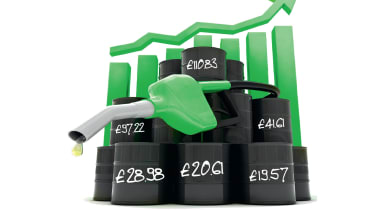Fuel prices to rocket in 2012
Diesel prices are set to soar to more than 145 pence per litre this year, as fuel shortages lead to higher pump prices
Few topics dominated the news in the pages of last year’s Auto Express like fuel prices. For the first half of 2011 they seemed to hit record highs each week. But why are petrol and diesel so expensive? We spoke to industry experts to create this definitive guide to everything you could ever need to know about pump prices.
As well as looking at how much they have increased over the past two decades, we asked an expert to tell you where they’re going in 2012. We were amazed by what we found – and you will be, too.
What makes up the price of a litre of fuel?
The exact proportions will vary slightly, but it’s about 59 per cent tax and 33 per cent for the underlying price of the petrol or diesel. Retailers take about five per cent, according to BP, to cover both their costs and profit. Transport costs make up about two per cent.
With a petrol price of 136p per litre (ppl), that translates to 80.62ppl tax (57.95p in duty and 22.67p in VAT), 45.54ppl for the petrol, 7.32ppl for the retailer and 2.52ppl for transport costs. VAT is applied after duty has been added to the price – so you pay tax on tax.
How much have prices risen?
The Energy Institute has provided us with data going back to 1991 on average pump prices, the rate of duty and the average cost of a barrel of crude oil. In November 1991, average petrol prices were 46.55ppl, and diesel prices were 46.07ppl. By November 2011, they had rocketed to 133.7ppl and 140.95ppl respectively. That’s a 187 per cent increase for petrol and a huge 206 per cent rise for diesel.
To put that into perspective, inflation over the same period has boosted the prices of goods and services by an average of 79 per cent according to the Office for National Statistics. Had fuel prices increased only by the rate of inflation, we’d currently pay 83.32ppl for petrol and 82.47ppl for diesel.
Why have they risen?
Tax increases and a rise in the cost of crude oil, although the latter has only really been a factor in recent years. Until 2004, the price of a litre of petrol and diesel before tax stayed pretty much consistently below the 20ppl mark.
Since 2009, though, it’s been steadily rising. In November 2011, the underlying price of petrol was 53.47ppl and diesel was 59.51ppl. In 1991, the underlying price of both was around 17ppl, so it’s increased by more than 200 per cent. However, the most consistent cause of increasing prices has been tax.
In 1993, John Major’s Conservative Government introduced a fuel duty escalator, increasing tax by inflation plus a little extra each year. Labour carried on the practice when the party came to power in 1997. The escalator was scrapped after fuel protests in 2000, yet in those eight years duty was in effect more than doubled from 23.42ppl to 47.82ppl. Motorists then had a period of respite, but Labour began upping duty once again in 2007. It reached a peak of 58.95ppl in 2010 before George Osborne cut it back to the current level of 57.95ppl.
What affects fuel prices?
Tax changes obviously have a big impact, but price fluctuations on a week-to-week basis are mainly down to changes in the price of crude oil and the exchange rate. “Oil prices are the biggest variable affecting petrol and diesel prices,” Damien Cox, lead energy analyst at broker EnergyQuote, tells us. “A 10 US dollar shift in the price of oil will have a 5p to 6p change in the pump price.”
Of course, it always seems like the oil firms pass on price hikes much quicker than cuts, but this is often because of the other variable: “The exchange rate has a big impact, too,” explains Cox. “Oil’s bought in dollars, so when the pound is strong against the dollar the price of oil is effectively cheaper, and vice versa.”
Do the seasons have any effect on prices?
Yes, but a limited one. “Petrol prices are more likely to go up in the summer,” says Cox. “That’s down to a rise in demand due to the so-called ‘driving season’. Winter is more likely to see a rise in diesel prices – especially if the US has a very cold winter.”
It’s strange that a bad winter could have a knock-on effect on our diesel prices, but it is true. That’s because of diesel’s similarity to heating oil. Both are known as ‘middle distillates’ because they come from the middle of a barrel of oil. That’s opposed to light distillates such as petrol and naphtha, which are drawn from the top of a barrel. “If the US has a cold winter,” continues Cox, “there’ll be a spike in heating oil demand. That pushes up the price of middle distillate and hence the cost of diesel.”
What role do speculators play?
There are mixed views on this and it’s impossible to say for sure. Cox tells us: “Over the past 20 years the financial markets and speculators have had a growing impact on the price of crude oil and therefore pump prices.”
AA fuel prices expert Luke Bosdet is more blunt: “Speculators have a huge impact on prices. Global demand for oil has dropped since 2008, yet prices are broadly the same – they’re held up by speculators.”
But Matthew Sinclair, director of the TaxPayers’ Alliance, has a different view. “Speculators aren’t the issue,” he says. “They push the price of oil down as much as they push it up. There’ll be short periods where they have a significant impact but in the long term they play a minor role.”
Who profits the most?
The Government, unquestionably. It takes a little over 80p from every litre of petrol and diesel sold at the pump in fuel duty and tax.
Oil companies do pretty well, too. According to their financial statements, BP made £3.2billion profit in the third quarter of 2011, and Shell made £4.5bn over the same period – although obviously that’s not only from petrol and diesel sales.
And forecourts? Hard to know for sure. Adrian Tink, RAC motoring strategist, says: “How much do retailers make? That’s the age-old question. Not much. About 1ppl in profit. Maybe 2ppl... 3ppl max. Judging by the prices supermarkets charge, it seems likely that they often make a loss on their fuel sales, using it as a way to get customers into their shops.”
So how much does the Government make?
The Government doesn’t give a breakdown of how much VAT it generates from different sectors, so it’s impossible to calculate how much VAT it makes from fuel sales. But around 24 billion litres of petrol and 25 billion litres of diesel are sold annually. In 2010/11, the Treasury took £27.3bn in duty alone. Current HM Revenue & Custom forecasts suggest that figure will fall to £26.9billion in 2011/12 and rise to £28.5billion in 2012/13.
What does the Treasury do with the money?
Whatever it likes. Fuel duty and VAT from fuel sales are counted as revenue – cash for the coffers. It’s not ring-fenced for road-related or even transport-related spending.
Is duty rate the same for petrol and diesel?
Yes. They were brought in line back in January 2002. Prior to that, diesel duty was 6ppl higher than petrol.
Is our fuel expensive compared to other countries?
Obviously that depends on where you compare us to. And prices will vary from week to week based on a range of factors, particularly exchange rates.
In Europe, the UK has some of the cheapest fuel before tax, but we have the highest duty. Still, we don’t do too badly for petrol compared to some Continental countries. Greece and the Netherlands saw prices pass 150ppl last year. And plenty of others, such as Italy, France and Germany, saw more than 140ppl.
But our diesel is among the most expensive. We’re the only place not to have a lower rate of duty for diesel than for petrol. For example, diesel duty in France is 42.8 cents (36.76p) per litre compared to 60.7 cents (52.14p) per litre for petrol. And our prices are twice as high as in the US. In November 2011, Americans were paying only 58.29p per litre for petrol and 66.47ppl for diesel.
Didn’t the Government cut duty earlier this year? So why haven’t prices fallen?
Duty was cut from 58.95ppl to 57.95ppl in the March Budget. Unfortunately, that penny saving was wiped out within a week due to the rising price of oil.
Between March and April 2011, the underlying price of petrol and diesel went up by more than 3ppl. That was fuelled by a 10 US dollar increase in the price of a barrel of crude oil. And, although oil prices dropped the following month, pump prices continued to rise. They hit all-time record highs of 136.79ppl for petrol and 141.58ppl for diesel in May, before falling in June – two months after the price drop in crude oil!
What is the Government planning to do?
In November’s Autumn Statement, Chancellor George Osborne announced he was cutting the 3ppl rise in duty that was scheduled for January. He’s also reduced August’s planned hike from 5ppl to 3ppl.
What should the Government be planning to do?
The AA and the RAC are agreed on this: regulate the oil industry. The RAC’s Adrian Tink says: “We would like to see a regulator to ensure oil firms are acting fairly. In an ideal world we’d like to see duty cut, too; it would be a big boost to the economy. But we need fuel prices to be more transparent.”
Matthew Sinclair at the TaxPayers’ Alliance says: “The Government needs to cut taxes. Motorists are getting a dreadful deal, and have been for years. The priority for this parliament should be to freeze duty at the very least – then the real price of petrol and diesel will fall.”
Where will prices go next year?
As so many variables affect the cost of fuel, there aren’t many people who can predict future prices with any degree of accuracy. However, Auto Express has tracked down one of the few who can. EnergyQuote provides fuel forecasts to businesses who run fleets, so that they can accurately predict their future costs.
We asked lead energy analyst Damien Cox to provide a month-by-month guide to where prices will go in 2012. “Prices will go up,” Cox tells us. “Especially after the duty increase in August. On average, oil prices will likely be marginally higher in 2012 than in 2011.”
That summer duty spike will see diesel pass the 145ppl mark and petrol hover dangerously close to 140ppl. So the bad news is, it doesn’t look like 2012 holds any respite for hard-pressed motorists. The good news is that, thanks to Auto Express, at least you are prepared!



